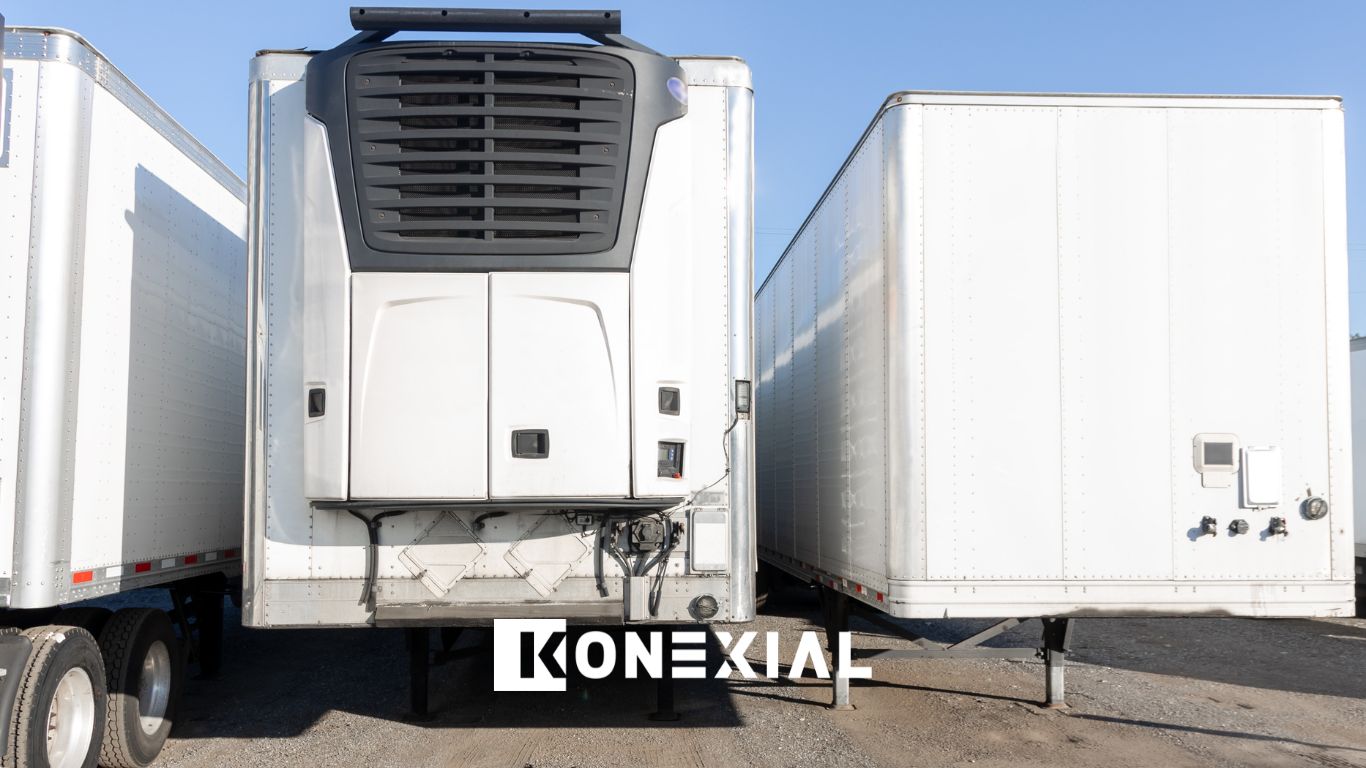Navigating the Decision Between Reefer vs Dry Van Trailers

Navigating the Decision Between Reefer vs Dry Van Trailers
Choosing the right type of trailer for your cargo is crucial. After all, this decision can significantly impact your business’s efficiency, costs, and ability to meet customer demands.
Two primary options dominate the industry: refrigerated (reefer) trailers and dry van trailers. Each serves unique purposes, catering to different types of goods and transportation needs. Reefer trailers, equipped to control temperature, are indispensable for perishable goods, while dry vans offer versatility for non-perishable freight.
This blog aims to explore the decision-making process between reefer vs dry van trailers, providing you with essential insights and guidance. Whether you’re transporting fresh produce or dry goods, understanding the key differences, costs, and operational considerations will empower you to make the best choice for your business.
Reefer vs Dry Van Debate
For fleet owners, managers, and executives, the decision often boils down to selecting between refrigerated (reefer) and dry van trailers.
So, what is a reefer trailer? A reefer trailer, short for refrigerated trailer, is designed to transport temperature-sensitive goods. These trailers come equipped with refrigeration units that can maintain specific temperatures, allowing the safe transport of perishable items such as food, pharmaceuticals, and other temperature-sensitive products.
And what is a dry van you may ask? A dry van trailer, on the other hand, is a standard enclosed trailer that is used to transport non-perishable goods. These trailers are versatile and can carry a wide range of cargo, from consumer goods to manufacturing materials. However, they lack the capability to control temperature, making them unsuitable for items that require refrigeration.
When comparing reefer vs dry van trailers, the primary distinction lies in their functionality: reefer trailers are equipped with refrigeration units to maintain specific temperatures, making them essential for transporting perishable goods such as food and pharmaceuticals. In contrast, dry van trailers are standard enclosed trailers used for non-perishable items like electronics and clothing. While reefer trailers involve higher initial and operational costs due to their specialized equipment and maintenance requirements, they can command higher freight rates. Dry van trailers, being more versatile and less costly to maintain, are suitable for a broader range of cargo, though they generally yield lower rates and face more market competition.
Key Considerations in Choosing Between Reefer and Dry Van
- Nature of Cargo: The type of cargo you plan to transport is the primary factor in your decision. If your business involves transporting perishable goods that need strict temperature control, such as dairy products, fresh produce, or pharmaceuticals, a reefer trailer is indispensable. Conversely, if your cargo includes items like electronics, clothing, or machinery that do not require temperature regulation, a dry van will suffice.
- Initial and Operating Costs: Reefer trailers are generally more expensive than dry vans due to the additional refrigeration equipment. The initial purchase price, maintenance, and operating costs (fuel for the refrigeration unit) can be significantly higher. It’s essential to weigh these costs against the potential revenue from transporting temperature-sensitive goods.
- Versatility and Flexibility: Dry van trailers offer more versatility as they can handle a broader range of cargo types. This flexibility can be advantageous if your business model includes transporting various types of goods. Reefer trailers, while more specialized, can sometimes be used as dry vans when the refrigeration unit is turned off, but this is not always efficient or cost-effective.
- Market Demand and Rates: Understanding market demand and freight rates for both reefer and dry van services is crucial. Reefer freight typically commands higher rates due to the added value of temperature control. However, this can vary based on market conditions, seasonal demand, and geographic regions. Conducting thorough market research can help you identify the most lucrative opportunities for your fleet.
- Maintenance and Repair: Reefer trailers require more frequent and specialized maintenance to ensure the refrigeration unit is functioning correctly. This includes regular inspections, servicing of the refrigeration system, and ensuring that the trailer is properly insulated. Dry vans, with fewer mechanical components, tend to have lower maintenance requirements and costs.
- Regulatory Compliance: Transporting perishable goods often involves stricter regulatory compliance, including food safety regulations and standards for pharmaceutical transportation. Reefer trailers must meet these requirements, which can add to the complexity and cost of operations. Dry vans face fewer regulatory hurdles, making compliance more straightforward.
Making the Right Choice for Your Fleet
To make the right choice between reefer and dry van trailers, start by assessing your business needs, considering both current and future cargo requirements. If your operations predominantly involve transporting perishable goods, investing in reefer trailers is likely the best option, whereas dry vans are more suitable for non-perishable cargo.
Next, evaluate the long-term costs and revenue potential. Although reefer trailers come with higher costs, they also offer the potential for greater revenue due to the specialized nature of their service. Conduct a cost-benefit analysis to see if the increased revenue justifies the additional expenses.
Additionally, keep an eye on market trends and demand for both reefer and dry van services to identify profitable opportunities. Maintenance and compliance are also crucial factors; ensure you have the necessary resources and expertise to maintain your trailers and adhere to relevant regulations to avoid costly penalties.
Finally, consider the flexibility and potential for future growth. A mixed fleet of reefer and dry van trailers can provide the versatility needed to adapt to changing market demands and expand your service offerings.
Effective fleet management is crucial for both dry van and reefer trailers, ensuring operational efficiency, cost control, and regulatory compliance. For dry vans, managing maintenance schedules and optimizing routes can reduce downtime and increase cargo turnover, enhancing profitability. Reefer trailers require even more meticulous management due to their refrigeration units, necessitating regular maintenance to prevent costly breakdowns and ensure temperature-sensitive goods are transported safely.
By employing robust fleet management practices, companies can maximize the lifespan of their trailers, improve customer satisfaction through reliable service, and maintain competitive advantage in the logistics industry. Whether you opt for the specialized capabilities of reefer trailers or the versatility of dry vans, the key is to ensure that your decision supports the long-term success and growth of your fleet. Contact us to learn more about fleet management solutions for your operational vehicles today!







